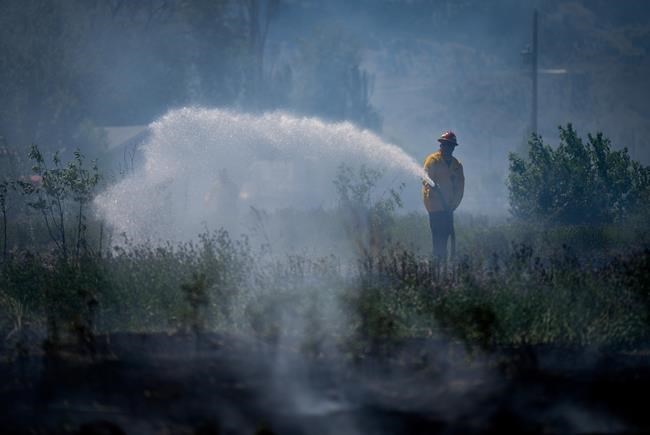
A firefighter directs water on a grass fire on an acreage behind a residential property in Kamloops, B.C., Monday, June 5, 2023. More firefighters from abroad are expected to arrive Wednesday in Canada as the country grapples with its worst wildfire season of the 21st century. THE CANADIAN PRESS/Darryl Dyck
Republished June 14, 2023 - 4:58 PM
Original Publication Date June 14, 2023 - 12:46 PM
Wildfires continue to rage in Canada in one of the worst seasons in recent memory. Not enough rain in Quebec fell to help the firefight, while B.C. reports fire above highway is held. Here's a look at developments Wednesday:
Canada expecting more firefighting help from abroad
More firefighters from abroad were expected Wednesday in Canada as the country grapples with its worst wildfire season of the 21st century.
Officials from Quebec said 240 firefighters, 100 from Portugal and 140 from Spain, are landing in Quebec City to aid in fighting some of the 130 forest fires raging across the province.
About 5,000 firefighters from other countries, including the United States and France, have been deployed across Canada, while teams from Chile and Costa Rica are expected in the coming days.
Prime Minister Justin Trudeau says Canada will continue to rely on foreign crews to fight fires in the coming years, and that it's clear Canada needs to increase firefighting resources at many levels.
Rain not halting wildfires in Northern Quebec
The rainfall in northwestern Quebec in the last 24 hours has not been enough to douse wildfires near Lebel-sur-Quévillon, 620 kilometres northwest of Montreal.
Quebec's forest fire prevention agency says less than one millimetre of rain fell in the area around the town, which was not enough to slow the growth of the blaze.
Officials had hoped the rain in the forecast would be enough to shift the fight against the fires and allow residents to return after being evacuated.
Currently, between 3,000 and 3,500 square kilometres of land is on fire around Lebel-sur-Quévillon, threatening the community and the nearby Nordic Kraft pulp mill.
Scattered rain will not extinguish B.C.'s wildfire risk
The BC Wildfire Service says a week of sustained rain is needed to extinguish fire risks around the province, but that is not in the forecast.
Operations director Cliff Chapman says the scattered rain across the province is welcome in the fight against a number of wildfires in one of B.C.'s worst fire seasons in recent memory.
The wildfire service is expecting up to 20 millimetres of rain in parts of B.C. in the next few days, and the precipitation is expected to help in the short term but not knock down fire hazards as the season enters the drier, hotter months of July and August.
Officials say there are currently four wildfires of note in the province that are highly visible or pose a potential threat to public safety, and more than 80 active blazes are currently burning across the province.
Northern B.C. highway threatened by approaching wildfire
A massive and growing wildfire in British Columbia's northeast is threatening the main highway connecting Yukon and the province.
The Peace River Regional District says an evacuation alert is now in effect for a section of the Alaska Highway as the out-of-control Donnie Creek fire spreads to an area about 140 kilometres south of Fort Nelson.
Communities north of Fort Nelson would face a 1,700-kilometre detour via highways 37 and 16 to reach the rest of British Columbia if the 4,875-square-kilometre blaze cuts off the Alaska Highway.
B.C. Forests Minister Bruce Ralston says 433 wildfires have burned 7,620 square kilometres of land since April, which eclipses the province's 20-year average for area burned.
Key wildfire on Vancouver Island now being held
An update from the BC Wildfire Service says the blaze that forced the closure of a stretch of a main Vancouver Island highway on June 6 is now classified as “being held.”
The service says that means the roughly two-square-kilometre fire is not likely to spread beyond predetermined boundaries under current conditions.
It says crews are working in steep, rocky terrain to establish control lines around the fire that sent rocks and trees tumbling onto the route east of Port Alberni.
Officials say safety concerns along Highway 4, which links Port Alberni, Tofino and Ucluelet with the rest of the region, will keep the route closed until at least June 24.
A lengthy and challenging detour is being used to allow people and supplies to reach the cut off communities, but it's meant to be used only for essential travel.
Wildlife an unseen casualty of historic wildfire season
Experts are sounding the alarm on the effects of this year’s wildfires on wildlife, with large blazes possible reducing or even wiping out some animal populations.
University of B.C. Okanagan biology professor Karen Hodges says birds are an obvious casualty, with nests, eggs and baby animals unlikely to survive a forest fire.
Hodges says even if the adult birds escape, they are unlikely to reproduce elsewhere, resulting in many animals not breeding for the entire year.
UBC researcher Matthew Mitchell says in addition to breeding concerns, smoke from the fire can affect animals’ lungs and change their immune responses and other behaviours.
Mitchell says while wildfires are part of an ecosystem’s natural cycle, increased frequency and intensity of large blazes are making it harder for the environment to recover, which may lead to the loss of some species.
This report by The Canadian Press was first published June 14, 2023.
News from © The Canadian Press, 2023